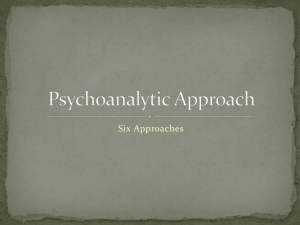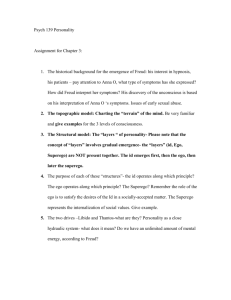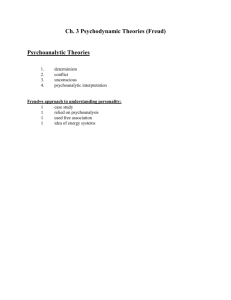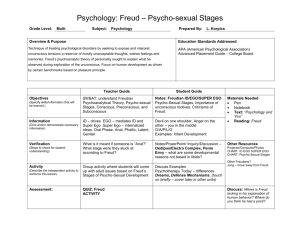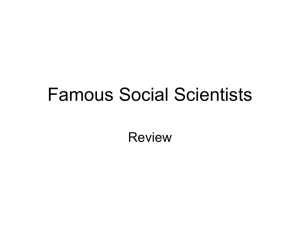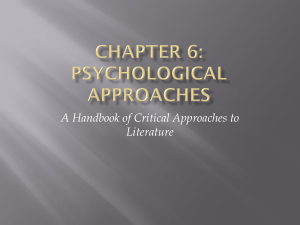Lecture 3-Freud - Columbia University
advertisement
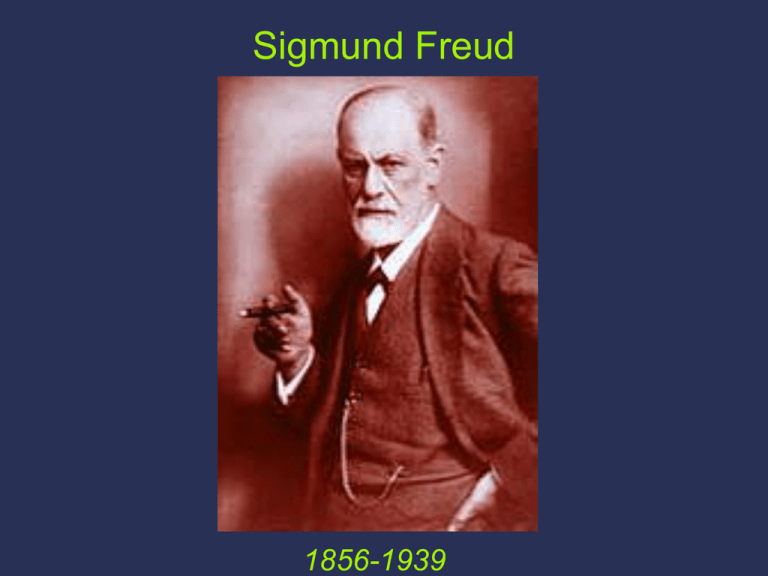
Sigmund Freud 1856-1939 CLASSICS BY FREUD • Three Contributions To The Theory Of Sex (1900) • Interpretation Of Dreams (1900) • Introductory Lectures On Psycho-analysis (1916) Significance of Freud’s Contributions: • Psychotherapy • Medical Model of Mental Disease • Theory of Unconscious • Theory of Psychosexual Development • Theory of Personality Dynamics Freud on the Significance of the Unconscious • By the unconscious nature of mental life we have called forth all the malevolence in humanity in opposition to psycho-analysis. Do not ... suppose that this opposition relates to the obvious difficulty of conceiving the unconscious or to the relative inaccessibility of the evidence which supports its existence. I believe it has a deeper source. Humanity has ... had to endure from the hands of science two great outrages upon their naive self-love: • The first was when it realized that our Earth was not the center of the universe, but only a tiny speck in a world system of a magnitude hardly conceivable; this is associated in our minds with the name of Copernicus. • The second was when biological research robbed man of his peculiar privilege of having been specially created, and relegated him to a descent from the animal world, implying an ineradicable animal nature in him: this transvaluation has been accomplished in our own time upon the instigation of CharlesDarwin, Wallace, and their predecessors, and not without the most violent opposition from their contemporaries. Freud on the Significance of the Unconscious (Cont’d) • But man’s craving for grandiosity is now suffering the third and most bitter blow from present day psychological research which is endeavoring to prove that the “ego” of each one of us that he is not even master in his own house, but that he must remain content with the veriest scraps of information about what he is going on unconsciously in his own mind. We psychoanalysts were neither the first nor the only ones to propose to mankind that they should look inward; but it appears to be our lot to advocate it most insistently and to support it by empirical evidence that touches every man closely. This is the kernel of the universal revolt against our science, of the total disregard of academic courtesy in dispute, and the liberation of opposition from all the constraints of impartial logic. Influences on Freud’s thinking (Zeitgeist) • Experimental Psychology - Search for Elements of Mind (Associationist Philosophers) - Method of Introspection - Measurement of sensation -- (Psychophysics) - Taxonomies of other sciences -- (Chemistry, Biology) • Literary - Dostoevsky - Hobbes • Mystical Influence - Orthodox Jewish background (Talmud) • Fruits of Materialism in Physics and Biology: - Bernard’s concept of homeostasis - Helmholtz’s concept of the conservation of energy. Oath: “No other forces than common physical and chemical ones are active within the organism.” Fyodor Dosteyevsky, Notes Every man has reminiscences which he would not tell to everyone but only to his friends. He has other matters in his mind which he would not reveal even to his friends, but only to himself, and that in secret. But there are other things, which a man is afraid to yell even to himself, and every decent man has a number of such things stored away in his mind (p. 57). Ludwig Borne: The Art of Becoming an Original Writer in Three Days Take a few sheets of paper and for three days on end write down without fabrication or hypocrisy, everything that comes into your head. Write down what you think of yourself, your wife, of Goethe, the Last judgment, of your superior-and when three days have passed you will be quite out of tour senses with astonishment at the new and unheard-of thoughts you have had. This is the art of becoming a new writer in three days. Mental Illness Jean- Martin Charcot (1825-1893) - investigated hysteria: manifests as delirium, paralysis, rigidity, blindness, inability to speak, loss of feeling, vomiting, hemorrhaging, seizures - believed in psychological cause of symptoms - used hypnotism to induce symptoms Freud as a Practicing Neurologist • Charcot’s Influence -Traditional view of hysteria -Male hysterics • Breuer’s Influence -“Studies of Hysteria” -Case of Anna O. Case of Anna O. Symptoms: - paralysis of right leg and foot - loss of sensitivity in right leg and foot - disturbance of eye movements - nausea - impairment of much of her vision - nervous cough - hydrophobia--obtained water only from fruits - speech impairment: could neither speak nor - understand German “absences” during the late afternoon Psychoanalysis • Method of “free association” • Slips of the tongue • Resistance • “Cathartic method” (talking out) • Transference • Dream Interpretation Aliquis Psychopathology of Everyday Life Freud’s conversation with a young student whom he meets on vacation: Student, who is protesting anti-Semitism of the AustroHungarian Empire, quotes line from Virgil’s Aenid: Exoriar aliquis nostris ex ossibus ultor. (Let someone arise from my bones as an avenger.) Instead, student said: Exoriar… nostris ex ossibus ultor. Student’s Free Associations “There springs to mind the ridiculous notion of dividing the word aliquis like this: a and liquis. Then: “reliquiem” (relic) “liquefying” “fluidity” “fluid” Then “strange” associations: “I am now thinking of Simon of Trent.” (A 15th century saint) “I’m now thinking of a recent newspaper article: ‘What St. Augustine Thinks of Women’.” “I met a man last week who reminded me of St. Benedict.” Freud: Three Saints: St. Simon, St. Augustine, St. Benedict. Young man’s next free association: “St. Januarius and the miracle of his blood”. Freud: Don’t St. Januarius and St. Augustine have to do with the calendar? Remind me of the miracle of blood. “They kept the blood of St. Janaurious in a phial inside the Church of Naples, and on a particular holiday it miraculously liquefied. The people attach great importance to this miracle and get very excited if it is delayed as it once happened when the French were occupying the town.” Young man blushed. “Something comes to mind…but it’s too intimate to pass on… besides, I don’t see any connection, or any necessity for saying it”. Finally, “I have suddenly thought of a lady from whom I might easily hear a piece of news that would be very awkward for both of us.” Freud guessed: “Have her periods stopped?” Young man: “How could you guess that?” Freud: “That’s not very difficult; you’ve prepared the way sufficiently. Think of the calendar saints, the blood that starts to flow on a particular day; the disturbance when the event fails to take place…In fact you made use of the miracle of St. Janaurious to manufacture a brilliant allusion to women’s periods.” Young man: “I certainly was not aware of it” Nature of Dreams • Function (Why people dream): -Wish-fulfillment -Preserve sleep • Contents (What people dream): -Manifest Content -Latent Content -Dreamwork • Dreams must be interpreted -Relative to recent experience(s) -Thematically • Futility of “glossary” approach to dreams: -phallic symbols - elongated object (trees, cars, swords, snakes, pens, etc.) -female symbols - receptacles (boxes, houses, cupboards, vessels, etc.) -intercourse - repetitive activities (climbing steps or ladders, riding a horse, etc.) A young woman who had already been married for a number of years dreamt as follows : 1. She was at the theatre with her husband, and one side of the stalls was quite empty. 2. Her husband told her that Elise L. and her fiance also wanted to come, but could only get bad seats, three for a florin and a half, and of course they could not take those. 3. She replied that in her opinion they did not lose much by that. (Freud, “A General Introduction to Psychoanalysis”, p. 128) Scene I 1. I am at the surface of the water. I start to sink. 2. I keep going down further and further; it seems that it will never stop. 3. It gets darker as more and more water pushes on top of me. 4. Then I stop and then I begin to rise. 5. Suddenly I am once again at the surface, out in the light. 6. I am on the edge of the water, people are around me. 7. I am the center of things. 8. And then from the outside my sister enters the group. 9. People turn towards her Scene II 10. The scene has changed; I am in a room which appears to be a part of a house. 11. This room is remarkably like my analyst’s office, but the room is larger. 12. I am on the couch, across the room is my dog. 13. Dr. B. is seated in his chair. I believe that he is smoking but I am not sure. 14. I do not and cannot seem to look at him. 15. I am most miserably, extremely unhappy. 16. I weep, I am so full of emotion that I can do nothing but cry and that comes only in sobs. 17. I see a clock, it reads 5:33. 18. I began to draw myself up, to see whether or not I can leave. SCENE II, cont’d 19. Dr. B. goes toward what seems like the kitchen and returns with a bowl. 20. It has several kinds of candy in it, the bowl is full. 21. I reach for a colored one, but he points to another kind. 22. I take the clear kind, the kind that reminds me of rock sugar candy. 23. Dr. B. leaves again to return in a few minutes. 24. This time he brings a cup and saucer filled with something hot. 25. I cannot be sure whether it be tea or coffee. 26. During all this time Dr. B. has not uttered a word, he has remained calm and matter-of-fact. 27. Suddenly I am awakened by our dog barking at what turns out to be the milk man. Theory of Personality • Components: - id - ego - super ego • Processes, not physical entities. ID, EGO, SUPER EGO • Id is the source of instinctual energy: - Timeless - Not modifiable, genetically defined. - Operates in accordance with pleasure principle: to maximize pleasure. - Activities of id are referred to generally as the primary process. ID, EGO, SUPER EGO •Id is the source of instinctual energy: • Ego - Primary process often needs correction because the infant cannot discriminate fantasy from reality. - Ego develops to insure that id is accommodated. - Derives energy from the id. - Uses reality principle. - Relies on secondary processes (learning, perception, memory). - Has no moral values. ID, EGO, SUPER EGO •Id is the source of instinctual energy: •Ego • Super-ego – Internalization of values of parents and society – Conscience: what leads to punishment – Ego-ideal: what leads to reward THEORY OF PSYCHOSEXUAL DEVELOPMENT • “It is remarkable that those writers who endeavor to explain the qualities and the reactions of the adult individual have given so much more attention to the ancestral period that to the period of the individual’s own existence -- that is, they have attributed more importance to heredity than to childhood.” (S. Freud, Three Contributions to the Theory of Sex, p. 35) • PIAGET -”The child is the future of man.” -“As the twig is bent, the tree’s inclined.” • Darwin (Instinct theory) • Influence of embryology. PSYCHOSEXUAL DEVELOPMENT • Notice etymology: “psycho” and “sexual”. - psycho: internalization of values regarding interpersonal relations - sexual: dealing with bodily pleasure • Early experiences with pleasure define the adult personality (embryological approach). • Erogenous development: Pleasure derives not only from genital organs but from mouth and anus as well. PSYCHOSEXUAL DEVELOPMENT, cont’d •Stages -pregenital -oral -anal -phallic -latent -genital All stages governed by expressions of instincts. -source (fixed) -aim (fixed) -object (variable) Prototype - established by adjustment of individual to challenges at each stage of development. PROTOTYPES Response: Prototype: Oral: - Taking in Acquisitiveness (fixation) - Holding on Tenacity (fixation) - Biting Destructiveness (fixation) - Spitting out Rejection (reaction formation) - Closing Negativism (reaction formation) Anal: - Expulsive - (fixations) - Retentive Messy, dirty, extravagant Frugal, compulsively clean and orderly (reaction formations) Phallic Stage (Castration complex) • Boys (Oedipus complex): -Desire to possess mother exclusively -Jealous of father -Fear of castration (what happened to girls) -Renounces mother -Identifies with father -Turns towards other women Phallic Stage (Castration complex), cont’d • Girls (Electra complex): - Desire to possess mother exclusively - Notices lack of penis - Feels castrated - Blames mother - Cathexis for mother weakens - Penis envy - Prefers father - Accepts hope of having a baby as substitute for penis

